Meet the Team: National Coordinator for People, Ponds & Water
26th November 2015
Meet another member of our team: Naomi leads the People, Ponds & Water team, co-ordinating the many aspects of our huge Heritage Lottery Funded project
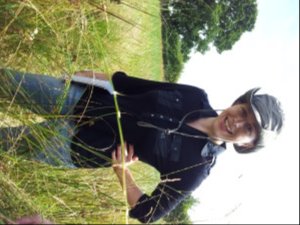 Tell me your name…
Tell me your name…
Naomi Ewald
And your job title?
I am National Coordinator for People, Ponds & Water
What does that involve?
I have a fantastic team of four regional projects officer and project administrator based in our Oxford office. Our job collectively is to raise awareness of the some of the best pond sites – Flagship Ponds – in the UK, find the hidden freshwater gems through the Clean Water for Wildlife project, and join forces with the volunteer recording community to develop the first national pond monitoring network – PondNet. My job is to make sure the team is happy and to ensure that we are supporting the volunteers to make this project as fun and fulfilling for them as it is for us.
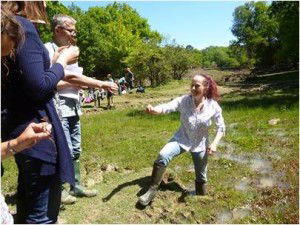 Training PondNet volunteers in plant survey
Training PondNet volunteers in plant survey
What’s so important about that?
The role is important because we are quite a spread out team. This could be a disadvantage, but I think one of the really valuable things about the project is the local connection. In order to connect with the sites and volunteers, we need that local, on the ground connection that the regional officers have. When you are out visiting sites you get the sense of the value of sites for the wildlife but also for the people who care about them. That’s why regional working is so good. But when you want to say something on a national level about freshwaters you need a national perspective, that’s my role, bringing together the local information and local data to create a robust national picture of the state of our freshwaters and the species they support.
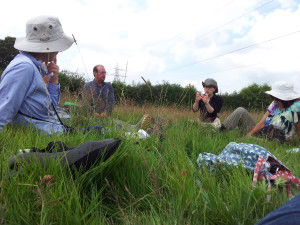 Talking to PondNet volunteers in Cheshire about Tubular Water-dropwort
Talking to PondNet volunteers in Cheshire about Tubular Water-dropwort
What is your favourite part of your job?
Through the project and through having these local officers, it’s given me the opportunity to go to places I wouldn’t have visited normally. Being able to share their local knowledge means I get more of the context of the local site. I’ve particularly enjoyed getting out and seeing new places.
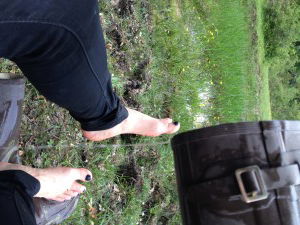 Not always a good day! A mismatch between water depth and wellie height.
Not always a good day! A mismatch between water depth and wellie height.
And least favourite?
Hard to reach ponds. For example, having arrived at a site where there had been an old record for great crested newts I realised the pond was now surrounded by two meters of blackthorn scrub and, after two hours of trying to get in to the pond, I found there was no water! So I spent another two hours climbing out, getting covered in scratches! But as the volunteers are finding out, these negative results and information on the pond habitat are as important as the positive records. Without these we wouldn’t know that things are changing or the underlying reasons for that change.
Why do you do it? What do you get out of it, and what keeps you going through the hard days?
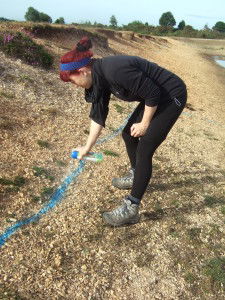 Naomi marking out plots for a Crassula control trial
Naomi marking out plots for a Crassula control trial
There are not that many hard days. It’s a demanding role, with long hours, and a lot of travel, but the whole reason I work for the organisation is that I feel really passionately about this and I feel that I have my dream job. I’ve always wanted to work in freshwater so if I wasn’t doing this as a job, I would be doing it anyway. I would be one of the volunteers. Every day, I think that’s interesting, what’s going on there, what’s this about? It’s really hard to think that any day is a hard day. I like the feeling that we are doing something that is actually going to make a difference.
What does freshwater wildlife mean to you?
I think my parents were quite progressive in terms of pond related wildlife when I was growing up. My parents dug up half the front lawn and turned it into a shallow pond and made what we now describe as an ideal garden wildlife pond with shallow edges. One day a golden ringed dragonfly landed on my sister’s back and I remember thinking, “Why isn’t it attracted to me? I want it on my back!” It’s my earliest memory and a special experience. I think that anyone would feel the same way if they got to stand in front of a pond, river or stream teeming with life. It is a “WOW!” moment. Sometimes I’m supposed to be surveying a really nice pond, but I find I’m just standing there, looking at all the life moving about my feet.
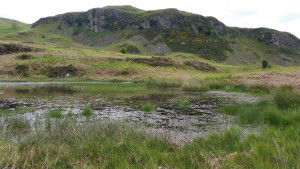 One of Naomi’s favourite ponds this year, in Cumbria
One of Naomi’s favourite ponds this year, in Cumbria
What’s your favourite freshwater habitat?
Ponds, ponds, ponds! Particularly a muddy temporary pond that looks like a cow’s been rolling in it! I’m drawn to it with an affection that is overwhelming.
What got you interested in freshwater habitats?
I left school and didn’t know what I want to do, but knew I wanted to work in wildlife, and at that time I had no idea you could specialise in freshwater work. When doing my degree, I volunteered for Hampshire and Isle of Wight Wildlife Trust and then got a job with them after I left. Part of my role was to help in the monitoring of some of Hampshire’s rarest freshwater species, like the fairy shrimp and tadpole shrimp. But the more I visited these ponds and found out about the animals and plants living there, the more questions it raised. So I decided there and then, that I would do a PhD and devote my future career to working in freshwaters. My PhD was on temporary ponds in the New Forest and I’ve continued to have a special connection to that area, even though I now work at a national level.
